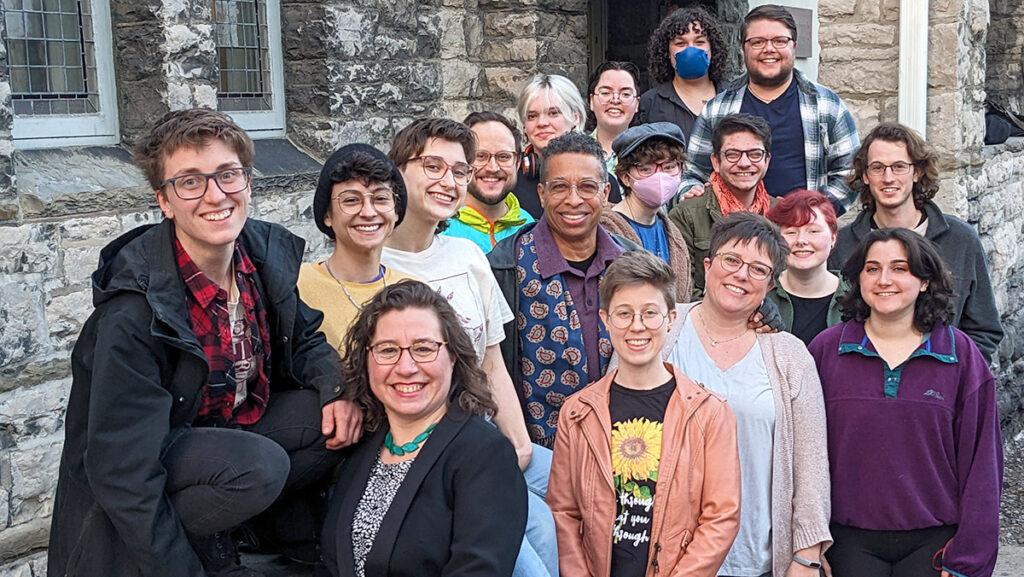Performing music together takes collective trust and care for each and every person performing. This has never been clearer than with Transpose: Ithaca Queer Singers Alliance.
Transpose has been around for about 14 years as the “Ithaca Gay Men’s Chorus.” The group was initially founded to be a space solely for gay men, but as new members joined over the years, the original name no longer felt accurate to the identities represented in the group. Jonah Hirst, associate director and community facilitator for Transpose, said the change had been a long time coming. During the height of the COVID-19 pandemic, leaders of the organization began to reconsider the way they ran things.
“In an absence of performance, I think our identity as a group and what our purpose was in our community became highlighted in a particular way,” Hirst said. “So the group decided, ‘OK, we want a name that says who we are.’ Partly because people wanted to join but didn’t want to join under specifically that label. Particularly people with gender-expansive identities did not necessarily want to be in a gender-specific place or a place that seemed gender segregated, even though in reality we weren’t.”
Long-time Ithaca resident Jennifer Lawrence Birnbaum began her role as director of the Ithaca Gay Men’s Chorus in September 2022. She had been a fan of the group since its inception in 2009. Eventually, Birnbaum became involved with the group as her child, who identifies as nonbinary, became a member. So, when Birnbaum heard that the former director would be leaving their position, she saw it as an opportunity to introduce necessary change to the organization.
“I walked into the first rehearsal with a ballot of, ‘What do you want our name to be?’” Birnbaum said. “And it was really clear from the first rehearsal that people were not in that mind space yet. … What was interesting is how many trans men had joined the chorus because they wanted a place to be accepted as a man. And I was like, ‘OK, let’s regroup and figure out how we’re going to move forward with this.’”
As a transgender queer-identifying man, Hirst knew he wanted to join a gay men’s chorus and have that space to make music with other queer-identifying men. Ultimately, he found that the group was incredibly accepting of people of all identities, not just gay men, so a name change became a necessity. Yet, Hirst still wanted the name to embody what gay men’s choruses originally stood for.
Historically, LGBTQ+ choral groups have been bastions of inclusion. Many gay men’s choruses and gay/lesbian choral groups were founded in cities all over the United States in the early 1980s as a way to fight the anti-LGBTQ+ discrimination that was coming to a head as the AIDS epidemic was beginning. Over the years, many gay men’s choruses like the famous San Francisco Gay Men’s Chorus, which first performed after the assassination of Harvey Milk in 1978, have opened their membership up to people of all genders and sexualities. While they have not changed their name, several other groups across the country have done so in an effort to continue the same principle of inclusion on which they were founded.
“We wanted to welcome as many queer and trans people in the door as possible and we needed to find a way to do that that also honored our history as the gay men’s chorus,” Hirst said. “And so it was important to honor what the gay men’s chorus was doing and to figure out how do we include a variety of voices and genders as well as maintain the visibility and the community space that the Ithaca Gay Men’s Chorus always was.”
Ithaca College senior Sona Minasian, a music education and piano major, joined Transpose in Fall 2022 after being recommended to the director by Dawn Pierce, associate professor in the Department of Music Performance. Minasian, who is now the piano accompanist and a steering committee member for the group, said he feels grateful that xe is able to make music with other LGBTQ+ musicians in such a safe and welcoming environment.
“I really loved the space immediately because I really needed a space to see older queer and trans folks … that was totally separate from IC,” Minasian said. “It’s cool when everyone in the room is there because this is a queer group and we’re here to be in the queer group. … I guess it is kind of like you’re walking into an alternate universe where queerness is at the center rather than straightness and cishet normativity.”
Hirst echoed that sentiment, adding that relieving LGBTQ+ people of labels and gendered voice parts has allowed Transpose and its members to flourish.
“Performing with other queer and trans singers and musicians is a place where we get to reverse the narrative that we’ve been told, which is, ‘You can’t do that,’” Hirst said. “Every gender-nonconforming singer I’ve ever met has had some way in which they wanted to express themselves musically and weren’t able to do so because they didn’t fit within the gender binary. That’s my story. That’s many of the people in the chorus.”
Hirst said he is proud of the way in which the group went about choosing its new name.
“Being able to change our name to reflect our growth is, to me, not only itself a queer and trans narrative — many queer and trans people who themselves grow over time decide to choose different names — the fact that we did that as a group and we did it without voting, we did it through discussion and consensus and really heartful group work really amazes me,” Hirst said.
Transpose will hold its next concert at 4:30 p.m. April 23 at First Baptist Church in Ithaca.














